BSimple, dramatically colored and with poisonous spikes, barbed wire not only looks dangerous, but has proven to be a serious threat to all other fish in the Caribbean. William Álvarez, who lives in Chichiriviche de la Costa Bay on Venezuela’s central Caribbean coast, has made it his mission to take care of the threat. Each day he removes them one by one from the water. He also encourages tourists and other members of the fishing community to catch and eat lionfish to control its voracious growth. The species destroys herbivorous fish that are important to the livelihoods of coral reefs and coastal communities.
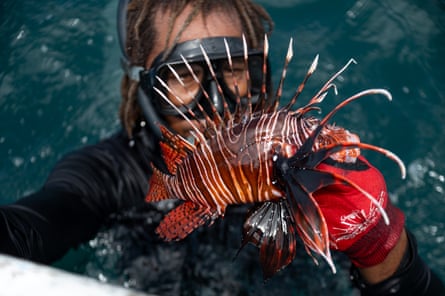
The sea is my livelihood and I know what is happening: the lionfish is wiping out other species and there is no one to control it, so every time I go to sea with my harpoon there is an opportunity to remove them, says Álvarez. 37, after the fish day.
Lionfish were inadvertently introduced to the region from the Indian and Pacific oceans, where they co-exist with natural predators such as large moray eels, sharks, stingrays and toads.
But there are no natural predators in the Caribbean. The bright orange, brown, and black lines covering the lionfish’s body, along with its venom-laden spikes, warn other species that might consider feeding on it. Some fish run away when they see this.
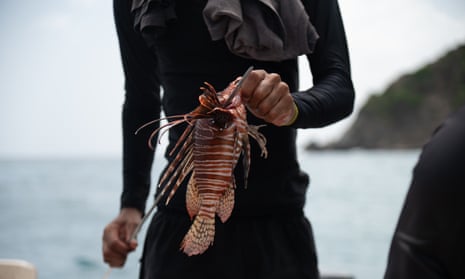
It’s not easy to catch. If it gets caught in the net, there’s a risk you’ll get one of its spikes injured and you won’t be able to work for days, says Rafael Mayora, 26, who often works with Álvarez. Therefore, many fishermen choose not to go near it. Its presence is also a threat to tourists.
Because fishermen tend to avoid this species, and because it breeds so quickly, laying up to 30,000 eggs every four days, numbers have increased significantly. Lvarez says the best method to catch them is using a spear or harpoon, but it’s a time-consuming process.
You can’t just cast a net and pull them all out, you have to throw out the spear one by one, something only some divers and spearfishers do, he says.
I worry. I know it’s an emergency because when I go to a cave I haven’t checked before, I sometimes find more lionfish than other species because they eat the baby fish before they breed, which is critical.
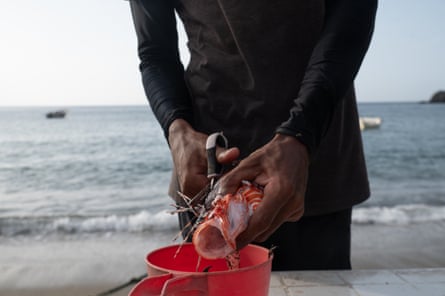
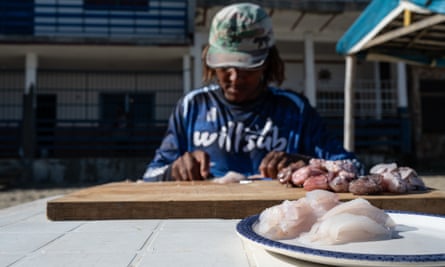
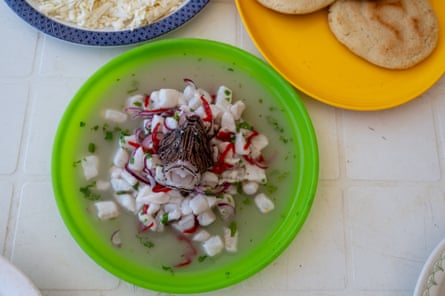

- Preparing to eat lionfish: first it is important to remove the dorsal fin, where the poisonous spines are located, then the fish can be made into ceviche, which has become a common dish of Chichiriviche de la Costa.
Lvarez promotes the capture and consumption of this species through his social networks and spreads the idea among tourists and local people.
I take lionfish out all the time. Sometimes I cook them for sale, sometimes to share with my family, but there is always fresh lionfish in the freezer, he says.
Humans are predators par excellence and I think we are the only ones who can help control the situation in the Caribbean in this case because there have been attempts to get other species to feed on them but nothing has worked. adds.
Lvarez dives 20 to 30 meters to catch fish and each time removes the lionfish along with the plastic found on the seabed.
I know that what I am doing will not have the impact that I would like, I will not change the situation or stop pollution, lionfish or illegal fishing of protected species, but I believe that if everyone does their part, things will get better. says.
Lionfish: the facts
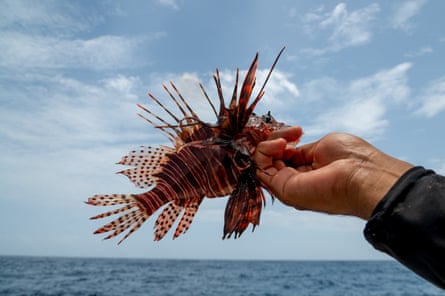
- The lionfish is distributed throughout the reef ecosystems of the Atlantic Ocean, Gulf of Mexico and the Caribbean where it feeds on berries, small fish, crustaceans and molluscs.
Common in the Indian and Pacific oceans, lionfish have become one of the most damaging marine invasive species on the planet. Invasive species are defined as having few or no predators after entering a new ecosystem, causing their population to explode and crowding out others, preventing the healthy functioning of the ecosystem.
A voracious predator, the lionfish has spread across the reef ecosystems of the Atlantic, Gulf of Mexico and Caribbean at an astonishing rate, releasing thousands of eggs every few days and up to 2 meters per year. They feed on smaller fish that are important to commercial species such as snapper and grouper, and fish that are key to maintaining the health of coral reefs. A controlled experiment conducted in 2008 found that when lionfish appeared in the Bahamas, juvenile reef fish populations could drop by 80% within five weeks.
Conservationists are encouraging people to eat the invasive fish that have now spread to the Mediterranean to keep their numbers under control. Fishing tournaments are now regularly held in Florida and the Caribbean.
In September, a United Nations estimate found that invasive species cost the world $423 billion ($340 billion) a year and have become the main threat to diversity on Earth, with alien species threatening marine ecosystems.
#reef #menu #Caribbean #fishermen #wage #war #invasive #lionfish
Image Source : www.theguardian.com